Holds our Monthly Feature and Monthly Feature data
By Sr Goretti Nalumaga, MMM
 In Uganda, near the shores of Lake Victoria, lies Katoogo, a swampy, impoverished neighbourhood where provisional houses are often swallowed by floodwaters during the rainy season. Most dwellers in Katoogo are individuals who grew up on the streets or migrated there seeking cheaper living options, often unaware of their ancestral roots. The submerged pathways force residents including volunteers and visitors alike to wear long boots just to reach those in need. Two heavy rain seasons make access impossible, prompting us to call residents to meet us in safer locations.
In Uganda, near the shores of Lake Victoria, lies Katoogo, a swampy, impoverished neighbourhood where provisional houses are often swallowed by floodwaters during the rainy season. Most dwellers in Katoogo are individuals who grew up on the streets or migrated there seeking cheaper living options, often unaware of their ancestral roots. The submerged pathways force residents including volunteers and visitors alike to wear long boots just to reach those in need. Two heavy rain seasons make access impossible, prompting us to call residents to meet us in safer locations.
These photographs capture the challenging environment we visit, the waterlogged areas where our vulnerable beneficiaries live. You can see residents including volunteers carefully navigating the flooded paths, risking slips and falls, to reach families in desperate need. Many homes have been compromised by the rising waters, facing daily dangers, from the risk of their houses collapsing to health hazards caused by unsanitary conditions. This forces residents, including children, to squat in unsafe conditions with neighbours. Despite the hardships, risk of house collapse and health hazards, they remain resilient, trusting that, with divine guidance, better days will come.
It follows me in moving light
A silent friend
It stretches along with the rising sun
And shrinks away when the day is done.
It dances when I jump with glee
It copies every part of me
Though it is always by my side
It never speaks but it cannot hide
At dusk it blends with the evening’s hue
A shade of black
But still I know when night is through
My shadow waits to walk anew.
Sr. Berna Nakimuli, MMM
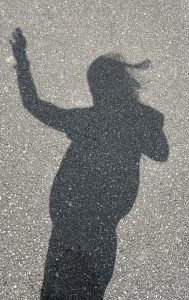
Sr Liana de Jesus, MMM, Brazil
Eidilair is deeply grateful for the help she received from MMM. How beautiful it would be if everyone who received assistance displayed such humility to express their thanks! I see her as a figure in the passage of people from Egypt to the Promised Land; she has suffered her whole life, but her faith in God has always remained strong. She waits for a day of transformation and resurrection, when she will be completely healed. The physical healing might not have happened, but the inner peace will bring her to a healing place to be.
Even amid pain and suffering, her closeness to God perseveres. Remarkably, she never stopped smiling, even in her most challenging times. Eidilair dos Santos is a single mother. She is in her mid-40s, she has suffered from diabetes since she was 30 years old and epilepsy since childhood. She lost her job when they discovered that she had epilepsy and diabetes. After this sickness, she has lost one leg and her vision.
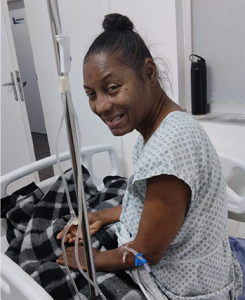 Eidilair’s life was so miserable that the MMM Sisters started helping her with food and medication. At the end of last year, 2024, she was able to get her (INSS pension) permission like a sick person, and she informed the MMM Sisters that she doesn’t need the help anymore, that she and her daughter now will be able to survive with this salary from the government. She is admitted to the hospital, she needs to get her second leg amputated and now all of her teeth have come out because of diabetes.
Eidilair’s life was so miserable that the MMM Sisters started helping her with food and medication. At the end of last year, 2024, she was able to get her (INSS pension) permission like a sick person, and she informed the MMM Sisters that she doesn’t need the help anymore, that she and her daughter now will be able to survive with this salary from the government. She is admitted to the hospital, she needs to get her second leg amputated and now all of her teeth have come out because of diabetes.
This woman represents many people who are in the same situation as her and do not have anywhere to go to seek help. If not for someone like the MMM Sisters, who follow up with some financial assistance with the generosity from our donors, their suffering would be even more severe, I see her story inspiring in terms of transparency, together with being accountable for what she has received. Her faith in God is tremendously strong. In fact, it is what gives her strength and determination. She also has deep trust in God that her life will be transformed according to His plan for her life.
The person who trusts and believes in God, like Eidilair, even in the pain and suffering, continues to be close to God. She always has a smile on her face despite her constant pain.
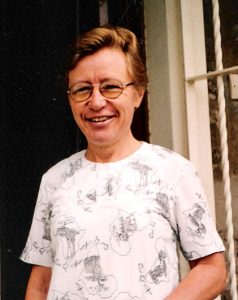 Dear Reader,
Dear Reader,
Warm greetings from Nairobi from where we struggle ‘day and night’ and try to alleviate suffering in the best way possible. At times it’s very overpowering but we still carry on as best we can. You have often been at our side and great things have been done through your tremendous generosity, especially in Education which continues to transform lives.
Let me tell you the stories of two young people I met recently and how your support has changed their lives.
Victor is a teenager I met two weeks ago; he is/was due to sit his Kenya Certificate Secondary Education (KCSE). He has only attended school erratically, the reason being that his mother works by scavenging on the largest dump site in Nairobi. When she can make 500 Kenyan Shillings which is the equvilant of Euro 3.70. He takes it to school where he is allowed in for a week to ten days. What I find most sad is that Victor is a B+ or an A student, but I’ve ensured that at least he can sit his Form/4, by paying the balance of school fees up to the exam in November. We will follow up on him and see if we can put him on a better ‘footing’ in life.
Daniel came into our office about two weeks ago also. This young man is a ‘high thigh’ amputee. He has struggled with major injury for more than two years now. He had come off a local transport (matatu) and was hit by a high-speed motorcycle. It tossed him into the ditch, and he landed in a drain – rather dank due to the presence of open sewage and the driver sped off. He lay there for some hours in & out of consciousness. Finally, a good Samaritan took him to the national referral hospital where he lay there most of the night unattended. In this condition it was understandable that he required an amputation.
Afterwards he went back to his rural family upcountry but there was nothing in that remote area to assist him. Finally, he returned to a friend in Nairobi slums, but it was not easy, and he felt a burden to a childhood friend who lived in a subsistence way also. Struggling with his crutches someone told him that he should try going around to churches as he might stumble on some form of charity. Well, it turned out that he arrived at the office where Mutuku and I were engaged in a planning meeting for the ten Victim/Survivors who came to our office the previous evening (at 4.30pm), ‘never rains but it pours’
Happily, life has changed for him, and he believes that his prospects are good. In consultation with him we set him up with a food trolley business. He sells cooked sausages and hard-boiled eggs which are kept hot with a small charcoal grill at the bottom. We got him a chair and umbrella as he will need to sit and also have shade from the burning sun. We have put him on the list of the Association of Physically Disabled of Kenya (APDK) to be measured and supplied with a prosthesis. He has found a niche close to the CBD where he can leave his trolley secured with a strong padlock. We are very confident that he will do well and there is no reason why he cannot have a family of his own in the future.
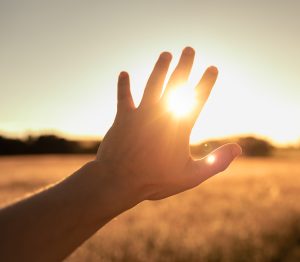 In John 14:27, Jesus tells us: “Peace I leave with you, my peace I give unto you: not as the world giveth, give I unto you. Let not your heart be troubled, neither let it be afraid.”
In John 14:27, Jesus tells us: “Peace I leave with you, my peace I give unto you: not as the world giveth, give I unto you. Let not your heart be troubled, neither let it be afraid.”
This peace is a healing gift, but we must first receive it ourselves before we can pass it on to others. Healing is not a one-time act; it is a continuous journey, and on that journey, we find the capacity to heal others.
There are two kinds of people in this world: the patients and the healers. Yet, the healers cannot truly heal if they themselves remain wounded. We can only share what we possess—our experience, strength, and hope. For many of us who struggle, whether with addiction or other burdens, prayer has been a source of relief and renewal. But more than that, it reveals a deeper truth: healing is not only a personal responsibility but a collective one. We must “carry the message,” not just for others but for our own growth.
Only by tending to our wounds can we guide someone else down the path we’ve travelled. If we focus only on others—their crises, their struggles—without attending to our own healing, our capacity to help is limited. The challenges we face are not obstacles; they are our greatest teachers.
Today’s world is filled with immense adversity: poverty, famine, grief, broken relationships, chronic illness, financial struggles, and the weight of uncertainty. These hardships are universal, yet how we choose to respond to them defines the healing we bring into the world. The more we accept healing for ourselves, the more we contribute to the healing of the world.
For me, as Josephine, I find this healing in prayer, faith in God, and sharing my journey with others. As Hebrews 11:6 reminds us, “He is the rewarder of those who diligently seek Him.” Healing comes when we seek it earnestly, and when we allow ourselves to be healed, we become living examples for others. In today’s world, many are sinking into despair. Depression is widespread, and isolation deepens. We need each other more than ever. By lifting others up and encouraging them to continue despite the weight of the world, we become enablers of hope.
We do not heal alone; we heal together. When we rise, we help others rise as well. The only way to truly heal is to first allow ourselves to be healed.
It all began in July 2021. It was set up as a home based and mobile outreach clinic working in 5 Local Government Areas, providing preventative, curative and rehabilitative care, elderly care, palliative care, maternal and child health, health education and awareness raising through sensitization. It has a strong collaboration with MOH, local government, community leaders and education boards. The Hospital has a geographical link with Teaching Hospital and University of Benin. As such, 40% of the local population is made up from these 2 institutions (students, academics, medical and paramedical staff). The remaining 60% of people are socioeconomically vulnerable, they lack affordable access to health services; of these 10% are children under 5 yrs, 12% are young people vulnerable to rape and abuse, 22% are women of childbearing age.
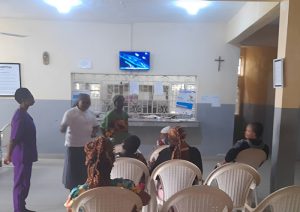
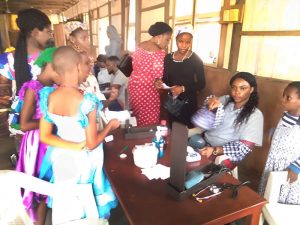 Uselu is a densely-populated neighborhood of Benin City, Edo State, Nigeria. Benin City is the capital and largest city of Edo State, southern Nigeria. It is the fourth-largest city in Nigeria according to the 2006 census, after Lagos, Kano, and Ibadan. Benin City is the centre of Nigeria’s rubber industry, and oil production is also a significant industry. The indigenous people of Benin City are the Edo people (the Benin People), and they speak the Edo language or Bini Language. The people of the city have one of the richest dress cultures on the African continent and are known for their beads (the beads stand for royalty and usually stand out during the traditional marriage of the Benin people), body marks, bangles, anklets, raffia work. They survive on subsistence farming of yam, plantain and cassava. In 2022, the population of Edo State was 4,777,000.
Uselu is a densely-populated neighborhood of Benin City, Edo State, Nigeria. Benin City is the capital and largest city of Edo State, southern Nigeria. It is the fourth-largest city in Nigeria according to the 2006 census, after Lagos, Kano, and Ibadan. Benin City is the centre of Nigeria’s rubber industry, and oil production is also a significant industry. The indigenous people of Benin City are the Edo people (the Benin People), and they speak the Edo language or Bini Language. The people of the city have one of the richest dress cultures on the African continent and are known for their beads (the beads stand for royalty and usually stand out during the traditional marriage of the Benin people), body marks, bangles, anklets, raffia work. They survive on subsistence farming of yam, plantain and cassava. In 2022, the population of Edo State was 4,777,000.

The main focus of our work
The Mother Mary Martin Hospital is a secondary Health Care facility that runs general outpatient, maternal and child welfare clinics which aim at providing quality and affordable health care to the general population as well as ensuring that pregnant women go into labour and deliver their babies safely. The Hospital offers holistic health care through preventive and curative services facilitating the people to be more health conscious and so, make informed decisions about their health. We have a robust yearly medical outreach plan for our different catchment areas where we create awareness about medical conditions like Hypertension and Diabetes. During these outreach programmes in the rural communities, women, children, the poor, the marginalized and people with disabilities avail of our waiver scheme on the medical screening tests/treatment for Malaria, Diabetes, Blood Pressure and Weight checks.
Children are admitted in an open ward in the company of their attendants. The ward is made up of 3 paediatric cots with rails to prevent the children from falling off the cot and sustaining injuries. The cots are arranged in a way that babies receiving care do not come in contact with each other. The newborn unit also has a separate ward for babies delivered outside the Facility to prevent cross infection. There is a Phototherapy machine, Continuous positive airway pressure machine (CPAP) Oxygen supply etc. The maternity area has three open wards and 1 private room with a total of 9 beds. The wards accommodate women in labour, post-natal, sick antenatal and other obstetric and gynaecological cases. The beds are spaced very well for easy movement and to prevent hospital acquired infections. There is constant electricity and water supply in the hospital and maternity area which is generated from solar energy, Power Holding Company (the national grid) and a standby generator. There is constant effort to maintain the buildings, make the wards hospitable and keep patients safe while admitted. There are separate wards for male and female patients for proper patient management. Each employee signs the staff code of conduct which spells out all that is expected for everyone for the maintenance of a safe environment. Generally, there are 24 hours staff supervision and monitoring of care administered to patients.
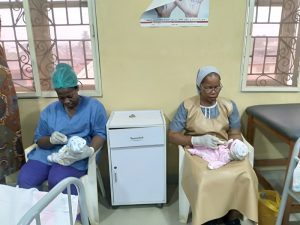 Some vulnerable adults are attended to in their homes and familiar environment during home- based care and visitations. Their family members are trained and guided on the needed care and support.
Some vulnerable adults are attended to in their homes and familiar environment during home- based care and visitations. Their family members are trained and guided on the needed care and support.
FUTURE PLANS
Procurement of X-ray machine
Registering with NHIS
Continuous capacity updating through serial training for personnel.
Recruitment of additional staff (5 at least)
Commencement of weekend laboratory services
MMM held a number of events to mark 50 years since the death of Mother Mary in 1975
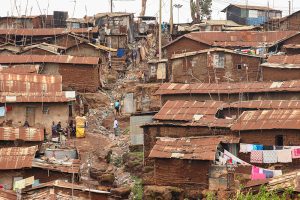 Editor’s Note: This short piece is taken from a longer article on Counter Human Trafficking which has been Sr. Mary’s ministry since 2006.
Editor’s Note: This short piece is taken from a longer article on Counter Human Trafficking which has been Sr. Mary’s ministry since 2006.
Since previous work in the Family Life Program (FLP 1987 – 1992) in the Kenya Catholic Conference of Bishops (KCCB), I had ample scope to get to know the more than 250 slums of Nairobi. It was referred to as the ‘green city in the sun’ but I doubt that anyone who thought s/he lived in the green city had ever put a foot inside its slums. My first trip into slums was during the Eucharistic Congress, September 1985. I joined a group going to do the Way of the Cross in ‘Mathare Valley’ slum. Prior to that I had worked in the vast hinterland of Trans Nzoia and Uasin Gishu – large farming areas. I only got stuck in extremely heavy rain and my front wheel drive always performed well!
Here in these miles of slums, I was both appalled and intrigued by how residents got rid of human waste. It was made with an empty tin with top and bottom cut out and inserted into the lower part of the huts (clay and wattle made) and that became the outlet for sewage. I had gone there in open sandals and once I saw the tins then I knew what gave them the odor of sewage I experienced afterwards. I finally had to discard the sandals. But I was very sobered to learn that half a million people lived there.
My next big trek there was during the World Social Forum, 2007. During that hectic time, we learned that 5% of the city territory was occupied by 95% of the people (those in extreme poverty), while 95% of the city territory was occupied by 5% of the residents. Fast forward ten years later and I found myself drawn to these same slums – they had just grown exponentially. Overcrowding and poverty had increased. Currently there are approximately 2.5 million slum dwellers in about 200 settlements in Nairobi representing 60% of the Nairobi population and occupying just 6% of the land.
This is a very harsh reality that the poor have to cope with every day.
The Annual Christmas Craft Fair was held in Drogheda on Saturday 23rd November and as usual, it was a most enjoyable day. Have a look at our photo gallery and join in the joy!
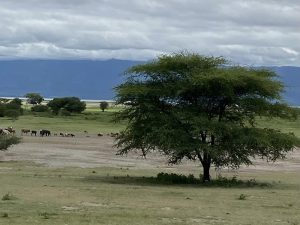 Recently we received this letter of gratitude from a young student nurse. We are grateful that MMM hospitality is still alive and active!
Recently we received this letter of gratitude from a young student nurse. We are grateful that MMM hospitality is still alive and active!
“Hello, my name is Claire Whyte from Lawrencetown, Ballinasloe, Co. Galway, grandniece of Sr. Edel Tanner (Strokestown, Co. Roscommon). I am a third-year general nursing student in the University of Galway. As part of my studies, I volunteered with three other students in my course at St. Elizabeth’s Hospital, Arusha, and Simanjiro Health Centre, Tanzania for the month of June 2024. The girls who also volunteered were: Grace Haugh from Clarinbridge, Co. Galway, Caoimhe Kenny from Craughwell, Co. Galway, and Ruth Kelly from Castlebar, Co. Mayo. It was an incredible, once in a lifetime experience that allowed us to witness both the challenges and the inspiring strength of the people in Tanzania. Tanzania is a country rich in culture and beauty and upon our arrival, we were immediately struck by the warmth of the people and the community.
As we were finding our feet, we visited the Medical Missionaries of Mary’s Convent where we were greeted with open arms. As we were all missing home, the nuns had prepared homemade scones, raspberry jam, and a hot cup of tea reminding us of home. They shared their stories of when they visited Ireland putting a massive smile on our faces. Sr. Protagia lived with my great aunt, Sr. Edel, for 15 years in São Paulo, Brazil. They showed us their gardens and the fantastic facilities they provide for the students in the school of Pharmacy.
We will be forever grateful for the kindness they showed us that afternoon.
With that in mind, I choose to donate the remaining money from my fundraiser to the Medical Missionaries of Mary, specifically for educational purposes in Tanzania.”
